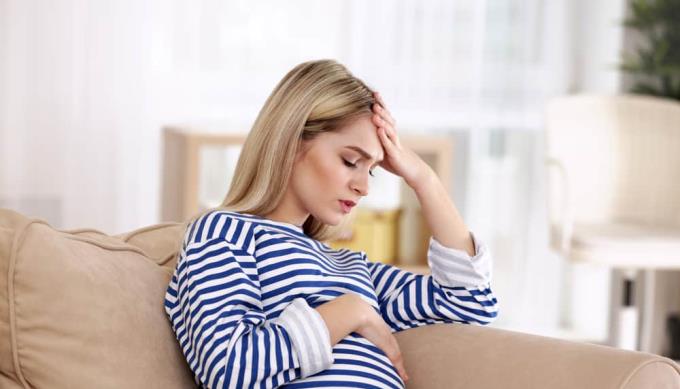Abdominal pain or diarrhea is a common problem with pregnant women. Although it is not directly life-threatening, if this situation continues continuously, there is a risk of serious dehydration, which negatively affects the health of both mother and child. So where does this problem come from, what is the best solution?
The joy of expectant mothers is to know that their baby is growing day by day through the size of the pregnant belly . During a strenuous pregnancy journey, pregnant mothers will have to face many different health problems, including abdominal pain.
According to experts, this disease can be seen at any stage of pregnancy. A study surveying 3,682 pregnant women showed that, about 14.3% of pregnant women had at least one abdominal pain and diarrhea. To prevent and take measures to effectively solve this problem, please consult the following information immediately.
Find out the reason why pregnant women have abdominal pain

The phenomenon of pregnant women having abdominal pain or diarrhea often stems from 5 basic causes directly related to pregnancy are:
Changes in diet and nutrition: After learning that they are carrying "a little angel" in their womb, many pregnant mothers rush to change their nutritional menu because if they eat the wrong way, they can give to unpredictable consequences. However, too sudden changes in food intake can easily cause stomach and stomach upset, leading to bowel movements or diarrhea.
Sensitivity to new foods during pregnancy: Food sensitivity has caused many pregnant mothers to suffer during pregnancy. The food before pregnancy is not much influence, now it can cause bloating, bloating and even make pregnant women have abdominal pain many times.
Pregnancy vitamins: It is essential for the health of both mother and baby to get extra vitamins during pregnancy . However, certain nutrients also have the ability to upset the stomach, upset stomach, and cause diarrhea or, conversely, constipation, such as iron tablets.
Changes in pregnancy hormones: Hormones in pregnancy, especially the rise of progesterone, slow the digestive system to work, intestinal motility prolongs the working time and too much relaxation leads to food status. stays in the stomach and colon longer, causing flatulence, discomfort in the lower abdomen. Hormone changes are the leading cause of both pregnancy constipation and diarrhea. Besides, the body's immune system is also weakened, opening the opportunity for pathogens from outside the environment to be easier to attack.
Lactose intolerance: Pregnant women often have to increase milk intake for pregnant women. Depending on the location, some women encounter lactose intolerance. Pregnant mothers suffer from this disease when eating and drinking dairy foods or drinks, the lactose in it will not be broken down and then transferred to the large intestine. Here, the bacteria break down lactose into a liquid and gas. From there, the body appeared symptoms in the digestive system such as flatulence, diarrhea.
In addition, you may experience diarrhea in your stomach due to less common causes such as:
Food poisoning during pregnancy
Gastrointestinal disturbances caused by a group of viruses that cause vomiting and diarrhea
Intestinal parasites
Irritable bowel syndrome
Certain drugs
Ulcerative colitis.
Crohn's syndrome
Celiac disease
Diarrhea also usually occurs in the 3rd trimester, near your due date. Sometimes, this can be one of the common signs of a pregnancy, according to the American Maternity Association . However, not all pregnant women have these signs in the last months of pregnancy.
Help pregnant pregnant women go out to cope with the disease

In addition to visiting your doctor, you can make changes in your diet to effectively deal with diarrhea and diarrhea.
1. Limit food that causes more diarrhea
Certain foods can make pregnant mothers worse. Therefore, you should be careful to stay away from fried foods that are high in grease, hot spicy foods and dairy products, carbonated and high caffeinated beverages, dried fruits, and foods high in sugar like candy or chocolate , red meats like beef.
Instead, you should actively use foods that are good for early pregnancy such as: rice, mashed potatoes (without additives), toast, bananas, cooked carrots, porridge, oatmeal. circuit ...
2. Adhere to a special diet
You should eat healthy foods like bananas, rice, apples, toast, potatoes, vegetables such as carrots, lean pork, chicken, yogurt that contain beneficial bacteria ... will help balance gut bacteria and provide nutrition.
3. Pregnant women go out many times a day so drink enough water
Make sure you drink enough fluids during pregnancy, especially if you experience pain in your stomach. According to MayoClinic , pregnant women should drink about 2.4 liters of water a day, because at this time you are having to hydrate 2 bodies.
In case of severe diarrhea, pregnant women should rehydrate and electrolytes by drinking plenty of fluids or using oresol. In addition to using filtered water, you can also drink juices that are good for pregnant mothers such as carrot juice, coconut water, lemon juice, strawberry juice, apple ... Filtered water will help replenish lost electrolytes. while the juice will add salt and potassium to the body after going out a lot.
4. Drugs to treat diarrhea for pregnant women
In this case, you should consult a doctor before use and should not be arbitrarily used without your doctor's permission to avoid complications occurring to the fetus and mother.
How to prevent pregnant women having abdominal pain

There are many different causes of stomach upset and diarrhea, so it is very important to understand the cause as well as prevent it from the beginning.
For those with a sensitive and weak digestive system, it is important to avoid spicy foods and foods high in fat and fat that are difficult to digest.
In addition to the above "taboos", pregnant mothers should also eat cooked and boiled, absolutely do not use raw vegetables, salads, blood broth or raw meat dishes ... Limit eating outside because of weakness. The food safety factor is not guaranteed.
Avoid eating too much seafood such as sea fish, shrimp, crabs, snails ... or the dishes that have caused stomach pain before.
If you have lactose intolerance , you need to cut down on your milk consumption and look for other sources of calcium for pregnant women to ensure your body is not deficient in calcium.
Avoid carbonated soft drinks and bottled drinks high in sugar and coloring.
Do not consume tea, coffee, grape juice and energy drinks.
Spending more time resting because diarrhea often leaves the body in a fatigued state.
To avoid putting pressure on the digestive system, pregnant mothers should split meals instead of just using 3 main meals. Before every meal, you should wash your hands thoroughly to avoid indirectly "putting" germs into the body.
Is going green manure dangerous?

It is very normal for a pregnant woman to have a bowel movement, but if you have green stools during pregnancy , this can cause anxiety and surprise. Consuming more chlorophyll-rich foods is likely to cause you this problem.
During pregnancy, pregnant mothers often eat a lot of green vegetables, plus the absorption of iron-rich vitamins, medications or supplements can make stools green.
When you notice green stools, do not worry too much, but remember to see what foods or foods you have consumed in the past. If the food does not turn the stools green, see your doctor immediately because it could be a sign of another special condition during pregnancy.
When do you need to see a doctor?

Prolonged diarrhea will lead to severe dehydration. If pregnant women have abdominal pain that goes out several times a day for more than 2-3 days, you need to see your doctor immediately. Because, the prolonged water can lead to many common complications in very dangerous pregnancy .
Some signs of dehydration are:
Dark urine
Lips, mouth dry
Persistent thirst
Urination
Headache
You don't need to worry too much about having diarrhea or having bowel pain during pregnancy. Calmly find out the reason for the safest and most suitable treatment for you!
















